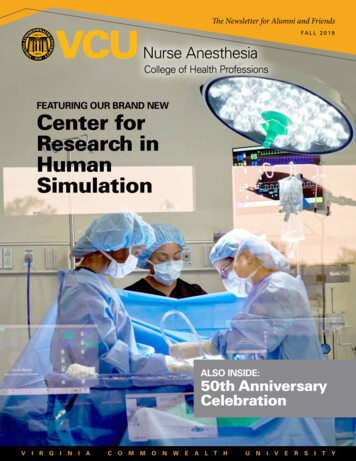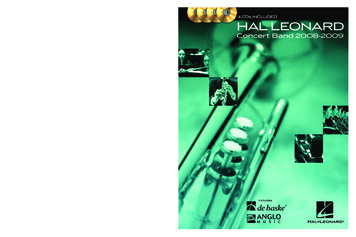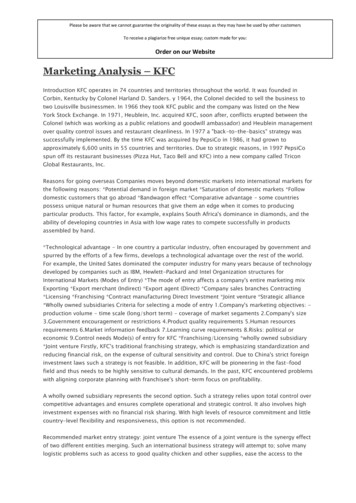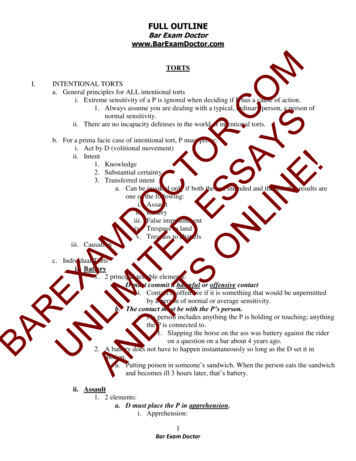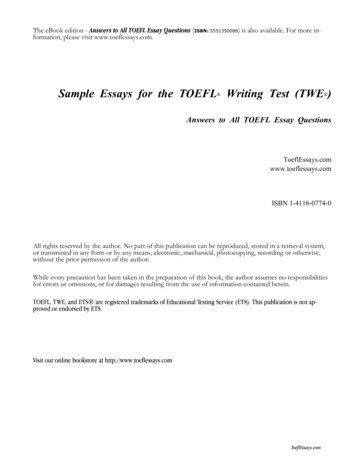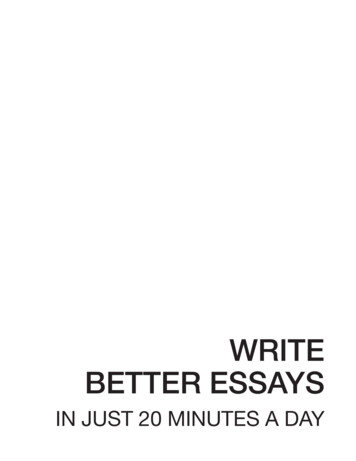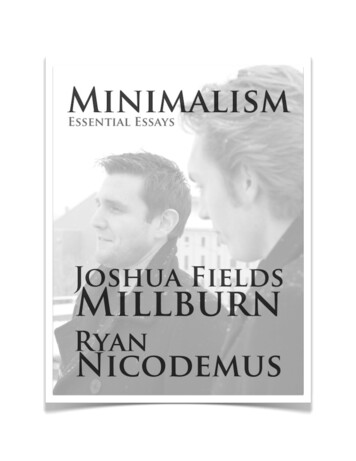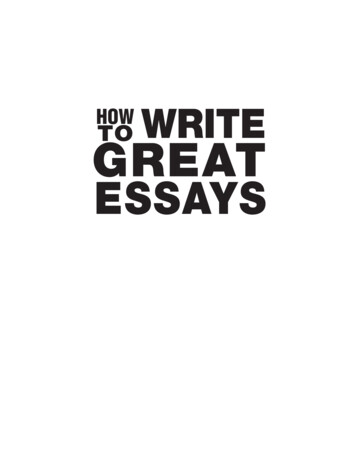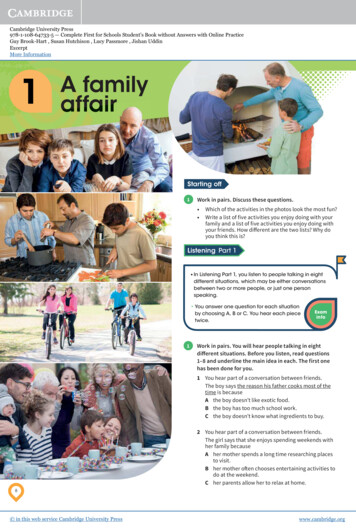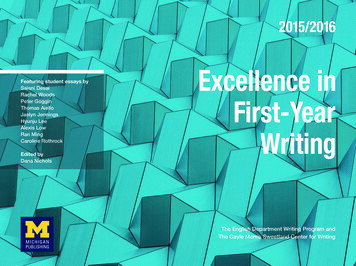
Transcription
2015/2016Featuring student essays bySajani DesaiRachel WoodsPeter GogginThomas AielloJaelyn JenningsHyunju LeeAlexis LowRan MingCaroline RothrockEdited byDana NicholsExcellence inFirst-YearWritingThe English Department Writing Program andThe Gayle Morris Sweetland Center for Writing
ExcellenceinFirst-Year Writing2015/2016The English Department Writing ProgramandThe Gayle Morris Sweetland Center for WritingEdited byDana Nichols
Published in 2016 by Michigan PublishingUniversity of Michigan Library 2016 Gayle Morris Sweetland Center for WritingPermission is required to reproduce material from this title in otherpublications, coursepacks, electronic products, and other media.Please send permission requests to:Michigan Publishing1210 Buhr Building839 Greene StreetAnn Arbor, MI 48104lib.pod@umich.eduISBN 978-1-60785-377-0
Table of ContentsExcellence in First-Year WritingWinners list5Nominees list6Introduction11Feinberg Family Prize for Excellence in First-Year Writing13Childhood as a Checklist of College-Readiness Skills15Gilman’s Message to Proponents of 19th-Century Patriarchal Ideals 23What Can We Learn from Serena Williams’ Twitter?Matt Kelley/Granader Family Award for Excellence in First-Year Writing3547Challenging Media Representations of the Global Refugee Crisis49Walking into Eternity along Sandymount Strand: Regarding the57Importance of Walking in the Works of James JoyceGranader Family Award for Excellence in Multilingual WritingWhat Can You Do on Your Own?67Females in STEM Need a Stronger Voice73Granader Family Prize for Outstanding Writing PortfolioJaelyn’s PageLex’s Writing Collection8399Excellence in First-Year Writing 2016 3
Excellence in First-Year Writing 2015/2016EDWP Writing Prize ChairsPhil WitteChris ParsonsEDWP Writing Prize CommitteeKathryne BevilacquaMika KennedyAlistair ChetwyndCassandra OtemuyiwaMaia FarrarMolly ParsonsKyle FrisinaAdrienne RawJoseph GaudetAli ShapiroMichael HinkenSweetland Writing Prize ChairDana NicholsSweetland Writing Prize CommitteePaul BarronDana NicholsGina BrandolinoKodi ScheerLouis CicciarelliSimone SessoloRaymond McDanielNaomi SilverChristine ModeyAdministrative SupportLaura SchulyerAaron Valdez4 Excellence in First-Year Writing 2016
Winners ListFeinberg Family Prize for Excellence in First-Year WritingSajani Desai, “Childhood as a Checklist of College-Readiness Skills”nominated by Ryan McCarty, English 125Rachel Woods, “Gilman’s Message to Proponents of 19th-Century Patriarchal Ideals”nominated by Sarah Linwick, English 124Peter Goggin, “What Can We Learn from Serena Williams’ Twitter?”nominated by Kyle Frisina, English 125Matt Kelley/Granader Family Prize for Excellence in First-Year WritingThomas Aiello “Challenging Media Representations of the Global Refugee Crisis”nominated by Robyn D’Avignon, History 195Caroline Rothrock “Walking into Eternity along Sandymount Strand: Regardingthe Importance of Walking in the Works of James Joyce”nominated by Karein Goertz, RC 100Granader Family Prize for Excellence in Multilingual WritingHyunju Lee “What Can You Do on Your Own?”nominated by Scott Beal, Writing 120Ran Ming “Females in STEM Need a Stronger Voice”nominated by Jing Xia, Writing 120Granader Family Prize for Outstanding Writing PortfolioJaelyn Jennings “Jaelyn’s Page”nominated by Gina Brandolino, Writing 100Alexis Low “Lex’s Writing Collection”nominated by Julie Babcock, Writing 100Excellence in First-Year Writing 2016 5
Nominees ListFeinberg Family Prize nomineesStudent NameInstructor NameJulia BerthelMindy MisenerDesiree ChewSarah LinwickSajani DesaiRyan McCartySmriti DharCassandra OtemuyiwaLydia FarinaEmily ChewJason FerranteKathryne BevilacquaMia GarrardLauren BenjaminJenny GhoseJennifer Alzate GonzálezPeter GocoEmily McLaughlinPeter GogginKyle FrisinaMeagan GoodingFrancesca MinonneBenjamin HsuEmily McLaughlinColin HulsJames PintoBen JacksonJames PintoAliya KhanFrancesca MinonneTina LamAdrienne RawTiffany LohEmily McLaughlinEllen LoubertLauren BenjaminRachyl LyonsShannon WaltonYishai RibonMindy MisenerAlex RogersMindy MisenerRebecca SchwutkeAdrienne RawLilian SheuAnn BolotinZhangzhida SongJames PintoSita SubramanianScott Beal6 Excellence in First-Year Writing 2016
Feinberg Family Prize nominees (continued)Student NameInstructor NameKeerthana SundarScott BealBlaise SurhighShannon WaltonHannah ThomsEmily ChewMadeline TurnerAngela BerkleyRebecca UhrAngela BerkleyLijing WangMindy MisenerRachel WoodsSarah LinwickAmily YangAnn BolotinBen ZamiaraMindy MisenerExcellence in First-Year Writing 2016 7
Matt Kelley/Granader Family Prize nomineesStudent NameInstructor NameThomas AielloRobyn D’AvignonClaire BartosicVlad BeronjaEmma BergmanDuygu UlaSamantha BreecherMegan WilsonSkylar BurkhardtScott BealEmily FishmanZacharias AndreadakisHannah FrenchJeff EvansMelissa GeorgeSahin AcikgozStephanie HarrisMaximillian AlvarezElizabeth HerrMegan WIlsonPaulina Hodges AdamsAnna Watkins FisherCasey JongSusan WaltonLyric KieberAnna Watkins FisherBranden LevineLauren BenjaminYeqing LinCatherine BadgleyVictoria LindenfeldRobin D’AvignonIshani MathurMegan BerkobienKatarina MazankaMaximillian AlvarezMolly McGaanZacharias AndreadakisJenna MenardAmy PistoneAnna MorrisonCatherine BadgleyDhara PatelVlad BeronjaCaroline RothrockKarein GoertzBette SunMegan BerkobienLiliana TalwatteGarrett RyanPhy TranSahin AcikgozSarah UddinScott Beal8 Excellence in First-Year Writing 2016
Student NameInstructor NameLia VallinaDuygu UlaChang YangPaul BarronEleanor ZinnAmy PistoneGranader Family Multilingual Prize nomineesStudent NameInstructor NameCynthia HuLori RandallEvelyn KimScott BealHyunju LeeScott BealXinshan LiJing XiaRan MingJing XiaSally ParkScott BealSirwich PipatprathanpornJing XiaJessie SongLori A. RandallYolanda YuLori A. RandallGranader Family Portfolio Prize nomineesStudent NameInstructor NameAisha CarterGina BrandolinoRex ChenSimone SessoloBreanna GillandJulie BabcockTiffany HuynhShelley ManisJaelyn JenningsGina BrandolinoAlex KahanLarissa SanoAlexis LowJulie BabcockRio MizunoLarissa SanoCarrie YuSimone SessoloExcellence in First-Year Writing 2016 9
IntroductionLearning to write effectively is central to a liberal arts education, andevery year first-year writing instructors throughout the College of Literature,Science and the Arts work with thousands of students to help them improve theirways with words. Day in and day out classrooms resound with discussions of effective introductions, with explanations of precision in language, with exchangesin peer response groups. For some students the first writing class at the Universitymarks the moment when they recognize themselves as writers.This book recognizes students who have been nominated by their instructors for producing writing of exceptional quality, a tradition carried out bythe English Department Writing Program and the Sweetland Center for Writingsince 2010. With generous support from the Granader family along with AndrewFeinberg and Stacia Smith, each of the students identified as winners will receivea cash prize. By producing this collection, we make the writing of prize-winningstudents available so that other writers may learn from, and feel inspired by theways these essays formulate compelling questions, engage in dialogue with otherthinkers, incorporate persuasive and illuminating evidence, express powerful andpoetic insights, and participate in meaningful conversations.The award-winning essays are shown to best advantage thanks to thecareful editing of Dana Nichols and the design work of Aaron Valdez. Many writers were involved in discussing and selecting these prize-winning essays. RaymondMcDaniel, Dana Nichols, and Naomi Silver read submissions for the GranaderFamily prize for Outstanding Writing Portfolios. Gina Brandolino, ChristineModey, Dana Nichols, Kodi Scheer, and Simone Sessolo read submissions forExcellence in First-Year Writing 2016 11
the Matt Kelley/Granader Family prize for Excellence in First-Year Writing.Submissions for the Granader Family Prize for Excellence in MultilingualWriting were read by Paul Barron and Louis Cicciarelli. Submissions for theEnglish Department Writing Program’s Feinberg Family Writing Prize were readby Kathryne Bevilacqua, Alistair Chetwynd, Maia Farrar, Kyle Frisina, JosephGaudet, Michael Hinken, Mika Kennedy, Cassandra Otemuyiwa, Molly Parsons,Adreienne Raw, and Ali Shapiro. We are deeply grateful to all of these writers forputting their own work aside to participate in determining which submissionsmerit special recognition.We are also very appreciative of the many instructors who encouraged andsupported their students and took the time to nominate them. Mostly, of course,we celebrate all the students who submitted essays for these writing prizes. Eachof them contributed significantly to the ongoing project of developing effectivewriters. As writing teachers we delight in learning from the challenging questions,intellectual energy, and creativity that students bring to the classroom every dayand to the pages that follow. We hope you will too.Anne Ruggles Gere, Director Sweetland Center for WritingAndrea Zemgulys, Interim Director English Department Writing Program12 Excellence in First-Year Writing 2016
Feinberg Family Prize forExcellence in First-Year WritingOn behalf of the selection committee, we are happy to present the threewinners of the 2015 Feinberg Family Prize for Excellence in First-Year Composition.These essays emerged from a competitive field nominated by English DepartmentWriting Program (EDWP) instructors; eligible work came from English 124 and125 classes during the 2015 calendar year. Instructors submitted pieces of writingin three categories that represent genres frequently practiced in EDWP: analyticargument, narrative argument, and research-based argument. As judges, we foundthe submissions presented us with the best possible situation: rewarding discussions and challenging decisions. The winners stood out for varying reasons, butthey also showed patterns of significant merit. Taken as a whole, they used genericconventions and pushed them. They made original arguments and renovated oldones. They conveyed their own voices but tuned them to a frequency that couldbe heard and responded to by others. To say the least, the winning essays shine asexamples of EDWP instructors’ unifying goal of helping students “produce complex, analytic, well-supported arguments that matter in academic contexts.”A number of people deserve thanks for service to this all-volunteer EDWPventure. First, Justine Neiderhiser and Danielle Lillge, who served as last year’scommittee chairs, made propitious changes to the selection process, includingthe institution of genre-based categories for prize submissions and the creationof clearer shared criteria for judges. We adopted their frameworks this year withonly minor adjustments. Second, eleven EDWP instructors served as judges and,through multiple rounds, generously donated their time and expertise in writingassessment to determine the finalists and winners of the Prize. Each conversationExcellence in First-Year Writing 2016 13
with these judges made us think about student writing in ways we had not before.Finally, the 30-plus students and their instructors who submitted an essay to beconsidered took a formidable risk. For students, sending a piece of writing outsidethe friendly confines of a supportive classroom can feel like a dangerous prospect,and, for instructors, nominating essays they assess as excellent makes a contestableyet generative assertion to EDWP as a whole. The program benefits from theiropenness, for which we are grateful.Finally, all the nominated essays, and the winners in particular, do EDWPa tremendous service. For those outside the department, they stand as a proxy forthe hard work and epistemological values of the teaching and learning that comesfrom Tisch and Angell Halls. These pieces of writing are part of the way we presentourselves to the university community. For instructors inside the department, thisvolume functions as an inspiration, an artifact of ongoing conversations aboutwriting, and an invaluable teaching tool. These essays will help EDWP instructorsimagine the contours of future student work in their courses and will offer modelsfor students to emulate and interrogate.The three essays that follow are the seventh set of essays to have won theFeinberg Family Prize from EDWP. We hope they evoke admiration and provokedebate, just as previous winners have for us.Chris Parsons and Phil WitteCo-Chairs of the Feinberg Family Prize for Excellence in First-Year WritingGraduate Student Mentors, English Department Writing Program14 Excellence in First-Year Writing 2016
Childhood as a Checklist of College-Readiness SkillsSajani DesaiFrom English 125 (nominated by Ryan McCarty)A danger of framing arguments around personal narratives is the possibility offalling into the assumption that one perspective can somehow trump broad socialunderstandings. These kinds of arguments say I know this is how everyone understands it but here is my story that shatters everything. These are arguments of aculture where perspectives speak to and not with others.Sajani’s essay is none of that. While she pushes hard against seeing life as a resume,she does so in the most delightfully self-reflective way. Her experiences are notdirect opposition but examples of how one individual encountered and rejectedreductive notions of growing and learning. Along the way, we see her critiqueher own thoughts and experiences with the same diligence that she applies to thecollege application machine, giving her essay an individualized validity that is rarein narrative arguments.But Sajani’s essay is not only rhetorically instructive. It inspires readers to investigate our own less-than-sterling motivations, collecting experiences as credentials.As a teacher, I could probably list this note on a cv somewhere, proof of pedagogical efforts, engagement with students and their writing. We’re encouraged tothink of the world this way, as a series of characters in self-serving word documents, as Sajani so starkly puts it. But, as she concludes, this reduction of otherscomes at the cost of our own humanity.To be both personal and instructive, critical and graceful, these are characteristicsI tend to strive for in writing and teaching, as well as in the way I think about mybroader experiences as a person among people. I find a good model in Sajani andher writing.Ryan McCartyExcellence in First-Year Writing 2016 15
Childhood as a Checklist of College-Readiness SkillsWhen I was six years old, I had no concept of college. My biggest goals atthe time were beating Daniel Weber in a footrace at recess or getting a smiley-facesticker on my weekly vocabulary test. I spent a lot of my time exploring the woodsin my backyard while pretending to be in a Magic Tree House book, or readingCalvin and Hobbes on a picnic blanket while absentmindedly ripping out handfulsof freshly-mown grass around me. Unfortunately, this kind of idyllic childhood isfar from universal. In the New York Times article, “Is Your First-Grader CollegeReady?”, a teacher in a first grade classroom had a different idea of how her studentsshould be spending their time. In an increasingly competitive world, Ms. Rigowanted to give her students an edge: to teach them the value of college education to make them goal-oriented, well-rounded people at a young age. Insteadof asking her students, “What do you want to be when you grow up?”, she asks,“How will you get there?” (Pappano 2).Schools around the country have begun to adopt a similar approach;campus tours are now popular field trips, and some argue that an overly-competitive culture has turned wide-open years of childhood into a race to college(Pappano 2). These shifting expectations and increased constraints for childrengrowing up today have immense ramifications, robbing them of a chance to “justbe a kid,” and to explore their likes and dislikes without the threat of failure limiting their choices. In a more harmful, less-explored way, the enormous pressureof being college-ready leads children to see their experiences in the world aroundthem as potential exploits for a college acceptance letter. It’s impossible to ignorethe impact of children’s entire lives being geared toward college; it demands thequestion of what is lost in the panic that is inevitablypaired with college preparation.Unlike the first-graders in the New York Times article who already hadtheir campuses picked out, I finally caught on to the college panic around sophomore year of high school. This was about the time everyone joined the National16 Excellence in First-Year Writing 2016
Honor Society, began volunteering at local food kitchens, and got jobs for thesummer. Countless resources with college information had the same checklist: “1.Take challenging courses. 2. Volunteer. 3. Use summers wisely” etc. (Johnson 1).I had the sinking feeling that I wasn’t doing enough, so I decided to go across thecountry for a summer internship in biology. I didn’t necessarily want to; spendingsix weeks in a windowless lab when I could have been doing pretty much anythingelse wasn’t my idea of fun, but I felt I needed to do something to stand out. Itwas about a year later when I sat down to fill out my college application, put myhands on the keyboard, and forced myself to type did I realize that I could write atmost, half of a paragraph on the actual internship itself. The technicalities of it allwere unimpressive to me, and likely to the poor soul who had to read hundreds ofstrikingly similar applications. What I did remember was my family flying out tosurprise me for my birthday, an impromptu trip to my favorite city in the wholeworld, and the laughs we shared while posing for pictures with street performers;but most of all, I remembered this conversation with my mentor:Me: “Okay, so I just pipet this protein into all twelve of these test tubes? Or justthe first six?”Him: “Hmm? Yeah.”Me: “Everything okay?”Him: “Yeah, just tired. My wife and I just had a son a few weeks ago.’Me: “Oh! Congratulations! What’s it like being a new dad?”Him: “It’s a little terrifying, actually. You know, it’s crazy how tiny and fragile heis. It’s not like a science experiment, where if I don’t think I’m going to get goodresults, I can just start over and tweak a few things in the protocol, you know? If Imess up, it’ll probably scar him for life. And it just seems way too easy to mess up.”His honesty caught me off-guard; it was an unexpected humanizingmoment from an almost stereotypically-stuffy cell biology researcher who barelyeven said “hi” to anyone when he came into work in the morning, ate lunchalone, and not-so-tactfully avoided any of my initial attempts at small talk. I hadnever heard him say so many words in one turn before, it was out of characterExcellence in First-Year Writing 2016 17
with his rushed, almost brusque rhetoric. My mentor telling me about his newrole as a father and revealing his fears about accidentally screwing his kid upsharply contrasted with the cut-and-dry, objective lab setting, just as my overallgoal of spending six weeks in a lab to appear more marketable to universities wasincongruous with the people I met and their stories, as well as the new stories Icreated for myself.I told myself it’d be the last time I’d get lost in the college tunnel vision;that the cost of missing out on experiences that I couldn’t use for my resumé wasn’tworth the approval of someone reading a two-paragraph summation of the pastdecade of my life. It was a little scary to realize that the only thing I gained fromthe internship happened by accident, not by my own doing, and that if everythinghad gone as I expected I would have returned no different than when I left. Evenmore unnerving, however, was finding out the “college tunnel vision” had becomeinnate; that it was how I automatically saw the world without even having to try,and that it wouldn’t change until I had been accepted into college.Of course, the small text box for extra-curricular activities on the CommonApplication didn’t leave much room for reflection. It didn’t leave room for me toconclude that what I gained most from the internship was not that I learnedhow DNA replicates, or how to properly use Centrifuge #2 in Room 640B; itwas how I saw the three-dimensionality of everyone around me. No one is justa “scientist” or a “student,” and a system set up in a way that wants students tobe well-rounded, but gives a guideline on how to quantify being well-roundeddoesn’t leave room for self-discovery through experience. The New York Timesarticle argues that “the impulse to line up achievements and to consider how achild’s record will play on a college application is contagious you have to join inor you will be left behind” (Pappano 5). This fear of being left behind is exactlywhat motivated me to change my habits and what I did in my spare time, and inturn, change myself. Arbitrary achievements each student should have, such as asummer internship, ignores the bigger picture: personal goals of self-improvementand gaining a better understanding of ourselves and those around us.18 Excellence in First-Year Writing 2016
Viewing my life and various experiences I went through in terms of whether or not I could possibly write a 500-word essay on them (one that would makeme look good) took away from the purity of “living just to live”. Dr. Guddemi,working in child development, was interviewed for the New York Times articleand worried that children being pressured to think college and career so early andlife “miss the here and now” (Pappano 10). As the threat of the college admissionprocess neared, I exemplified the worst of Dr. Guddemi’s concerns. I began toscrutinize the world around me and my place in it from the vantage of a collegeadmission counselor: if I heard a prospective student at the university talkingabout this specific event, would I believe she’d enrich the university environment?The thing is, it caused me to reduce myself to being the “ideal” student(or what I thought was the ideal student); someone who already knew everythingthere is to know about the world, had an altruistic attitude, and came from adiverse background. During a trip to India to visit family in high school, I evenfound myself thinking, “What if I write my college essay about my experiencesseeing poverty and how it makes me appreciate what I have?” Now, even thememory of the thought crossing my mind makes me cringe. Experiencing thetrip in terms of whether or not it could be a potential college essay (and a clichédone at that) made me feel guilty; I felt that I had taken an innocent experienceand exploited it to turn into something marketable and self-serving. Trips to Indianever caused me to feel lucky for my good fortune, or to feel pity for those whodon’t have the luxuries I do, at least not explicitly. However, the college admissionscounselor in my head didn’t want to hear about a small village on the other side ofthe world where I could walk into any house unannounced and be greeted withtoothy grins and more food than I could possibly eat in an entire day, because itwasn’t really an example of how I’d positively contribute to a university campus.A few years later when I returned to India (after I had already appliedto colleges), something about the trip felt different. Looking back, I saw thatfinishing the application process led me to transcend the boundaries being a “prospective college student” put on the world around me. I no longer saw everyoneExcellence in First-Year Writing 2016 19
I interacted with as a character in a self-serving word document, I saw them aspeople. On a more personal level, it led me to make sense of the world from theperspective of people and environments I wasn’t used to being around, and I nolonger tried to reduce the irreducible. My previous experience was limited to thebreadth of what could be covered in a paragraph, but this most recent one gaveme a glimpse of my place in the world: one that expanded beyond my role as afuture college student.I ended up writing one of my college essays about my extended family inIndia, who live in a small village surrounded by mountains hours away from thecity. The essay centered around individuals’ lives, hardships they went through,and going without luxuries I took for granted. In retrospect, this was a very surface-level analysis of the community. I had been blind to the complex workingsof village life, because I saw myself as an outsider looking in. I had trained myselfto be this way so that I could objectively decide what would make me stand outon an application, analogous to a scientist in my lab observing disease-riddenmice in the hopes of getting a publication in a prestigious journal. The ScientificMethod, however, does not apply to everyday experiences. What I missed was theentire mechanism by which members of the village oriented themselves within thecommunity, and how it impacted the stance they took toward the world. In myessay, I talked about how children had to walk two miles to school in the morning and how hard it must have been, but missed mentioning the songs they sangwhile walking or the complicated politics of women’s rights children as young asten years old discussed. I talked about how the villagers knew no life outside theirsmall society and felt bad that they’d never know the world around them, butfailed to notice that most of them had a far better sense of humanity than I did. Noinstance proved this better than when our 80-year-old neighbor who was nearlyblind but still worked as a seamstress mused, “The West is obsessed with keepingtime. You cannot be happy if your primary motivator is fear of time running out.”Preoccupied with defining myself within parameters of a college application, I missed something as obvious as the members of the village having a20 Excellence in First-Year Writing 2016
completely different definition of time than everyone else I knew. I did this alot within the four-year timeframe I was aware of the fact that I needed to becollege-ready. I played violin for three years then quit because I hated it; I volunteered at a food-donation warehouse putting cans into boxes when I wanted to bereading fiction under the big tree in my backyard. The choices I made to becomethe definition of “wellrounded” had the opposite effect. Not only did fear of beingrejected from college influence my decisions, but it changed how I saw myself. Itwas impossible for me to see myself as being more than a future college applicant,and I think I lost the better part of high school trying to be one.For me, preparing to apply for colleges is done with. I’m a lot moreabsorbed in my own education, because I’m not learning on a timeline. I joinedclubs, volunteered, and got a job out of desire, not fear. But for the first-gradersin Ms. Rigo’s classroom, and similar classrooms across the country, the collegeapplication process is only just beginning. Moreover, they are being taught andraised in an environment where everything they do is geared toward college andgetting a job, tying their entire self-worth to a goal that they may or may not evenwant to achieve. It’s good to have an edge, and to be prepared, but I think it’s vitalto remember that what makes us “college material” is often separate from whatmakes us human.Works CitedJohnson, Terri O. “Commentary: Preparing for College.” SWNewsMedia.com.N.p., 5 Feb. 2015. Web. 15 Feb. 2015.Pappano, Laura. “Is Your First Grader College Ready?” The New York Times.The New York Times, 07 Feb. 2015. Web. 15 Feb. 2015.Excellence in First-Year Writing 2016 21
22 Excellence in First-Year Writing 2016
Gilman’s Message to Proponents of 19th-CenturyPatriarchal IdealsRachel WoodsFrom English 124 (nominated by Sarah Linwick)Intrigued by Charlotte Perkins Gilman’s surreal and rather cryptic tale, “TheYellow Wallpaper,” Rachel devoted herself to researching its historical context andpossible meanings with an inspiring fervor. “Gilman’s Message to Proponents of19th-Century Patriarchal Ideals,” the culmination of her research and writingprocess, constitutes an analysis of this classic short story that is both novel andincisive. Clear and engaging at the level of the sentence, Rachel’s writing also attests to her knack for organizing her many ideas effectively. What makes her analysis especially compelling, however, is its capacious scope: at the same time thatRachel elucidates key parallels between Gilman and the narrator of “The YellowWallpaper,” she attends to the interrelationships among gender, power, resistance,and madness in the text. Highlighting the degree of agency that “madness” affordsthe marginalized narrator as well as the similarities between the wallpaper’s pattern and nineteenth-century feminist discourse, Rachel not only offers a fresh takeon a well-known tale but also advances an argument relevant to contemporarysocial struggles and debates.Sarah LinwickExcellence in First-Year Writing 2016 23
Gilman’s Message to Proponents of 19th-CenturyPatriarchal IdealsUnderstanding Gilman’s Personal Struggles as They Pertain to the StoryCharlotte Perkins Gilman was afflicted with an illness that baffled allof her family, friends, and even physicians. At times, she could neither sleep norsummon the strength to eat. Her husband and doctor labeled her condition“hysteria,” although today, it might be interpreted as some combination of depression and anxiety. Gilman’s husband in particular puzzled over her condition;she had a home, a husband, and had just given birth to a healthy baby girl. Whatcould be so wrong? It is difficult to pinpoint the causes of any psychological disorder, but Gilman herself seemed to think that it was the fault of the Rest Cure.The Rest Cure was prescribed by
The English Department Writing Program and The Gayle Morris Sweetland Center for Writing Excellence in . every year first-year writing instructors throughout the College of Literature, . the 30-plus students and their instructors who submitted an essay to be considered took a formidable risk. For students
